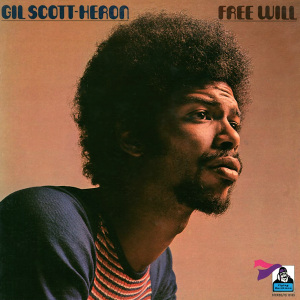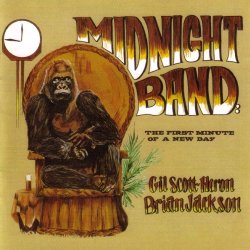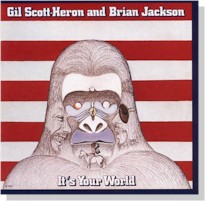Related Research Articles

Gilbert Scott-Heron was an American soul and jazz poet, musician, and author, known primarily for his work as a spoken-word performer in the 1970s and 1980s. His collaborative efforts with musician Brian Jackson featured a musical fusion of jazz, blues, and soul, as well as lyrical content concerning social and political issues of the time, delivered in both rapping and melismatic vocal styles by Scott-Heron. His own term for himself was "bluesologist", which he defined as "a scientist who is concerned with the origin of the blues". His poem "The Revolution Will Not Be Televised", delivered over a jazz-soul beat, is considered a major influence on hip hop music.

Strata-East Records is an American record company and label specialising in jazz founded in 1971 by Charles Tolliver and Stanley Cowell with the release of their first recording Music Inc. The label released over 50 albums in the 1970s. Many of the label's releases are now hailed as prime examples of 1970s Post-Bop, Spiritual Jazz, and Afro-Jazz.

Brian Robert Jackson is an American keyboardist, flautist, singer, composer, and producer known for his collaborations with Gil Scott-Heron in the 1970s. The sound of Jackson's Rhodes electric piano and flute accompaniments featured prominently in many of their compositions, most notably on "The Bottle" and "Your Daddy Loves You" from their first official collaboration Winter in America.

Malcolm Cecil was a British jazz bassist, record producer, engineer and electronic musician. He was a founding member of a leading UK jazz quintet of the late 1950s, the Jazz Couriers, before going on to join a number of British jazz combos led by Dick Morrissey, Tony Crombie and Ronnie Scott in the late 1950s and early 1960s. He later joined Cyril Davies and Alexis Korner to form the original line-up of Blues Incorporated. Cecil subsequently collaborated with Robert Margouleff to form the duo TONTO's Expanding Head Band, a project based on a unique combination of synthesizers which led to them collaborating on and co-producing several of Stevie Wonder's Grammy-winning albums of the early 1970s. The TONTO synthesizer was described by Rolling Stone as "revolutionary".

From South Africa to South Carolina is a studio album by the American vocalist Gil Scott-Heron and the keyboardist Brian Jackson. It was released in November 1975 by Arista Records. Scott-Heron performed "Johannesburg" and "A Lovely Day" on Saturday Night Live in December 1975. The album was reissued in the late 1990s via Scott-Heron's Rumal-Gia label, distributed by TVT Records.
Re-Ron is a 1984 song by Gil Scott-Heron. It criticizes the campaign for the re-election of Ronald Reagan. It was recorded in collaboration with Bill Laswell.

Pieces of a Man is the first studio album by American vocalist Gil Scott-Heron. It was recorded in April 1971 at RCA Studios in New York City and released later that year by Flying Dutchman Records. The album followed Scott-Heron's debut live album Small Talk at 125th and Lenox (1970) and departed from that album's spoken word performance, instead featuring compositions in a more conventional popular song structure.

Winter in America is a studio album by American vocalist Gil Scott-Heron and keyboardist Brian Jackson. It was recorded in September to October 1973 at D&B Sound Studio in Silver Spring, Maryland and released in May 1974 by Strata-East Records. Scott-Heron and Jackson produced the album in a stripped-down fashion, relying on traditional African and R&B sounds, while Jackson's piano-based arrangements were rooted in jazz and the blues. The subject matter on Winter in America deals with the African-American community and inner city in the 1970s.

Free Will is the second studio album by American recording artist Gil Scott-Heron, released in August 1972 on Flying Dutchman Records. Recordings sessions for the album took place on March 2 and 3, 1972 at RCA Studios in New York City, and production was handled by producer Bob Thiele. It is the follow-up to Scott-Heron's critically acclaimed studio debut, Pieces of a Man (1971), and it is the second album to feature him working with keyboardist Brian Jackson. Free Will is also Scott-Heron's final studio album for Flying Dutchman. The album reissued on compact disc in 2001 by Bluebird Records with alternative takes of eight tracks from the original album.

The First Minute of a New Day is an album by American vocalist Gil Scott-Heron, keyboardist Brian Jackson, and the Midnight Band—an eight-piece musical ensemble. It was released in January 1975 on Arista Records. Recording sessions for the album took place in the summer of 1974 at D&B Sound in Silver Spring, Maryland. It was the follow-up to Scott-Heron's and Jackson's critically acclaimed collaboration effort Winter in America. The First Minute of a New Day was the first album to feature "Winter in America", the title track of Scott-Heron's previous album which was not featured on its original LP release. The album was reissued on compact disc by Scott-Heron's label Rumal-Gia Records in 1998.

"The Bottle" is a song by American soul artist Gil Scott-Heron and musician Brian Jackson, released in 1974 on Strata-East Records in the United States. It was later reissued during the mid-1980s on Champagne Records in the United Kingdom. "The Bottle" was written by Scott-Heron and produced by audio engineer Jose Williams, Jackson, and Scott-Heron. The song serves as a social commentary on alcohol abuse, and it features a Caribbean beat and notable flute solo by Jackson, with Scott-Heron playing keyboards.

It's Your World is a studio album by American vocalist Gil Scott-Heron and keyboardist Brian Jackson, released in November 1976 by Arista Records. Recording sessions for the album took place in studio and live in July 1976 at Paul's Mall in Boston, Massachusetts, Electric Lady Studios in New York City, and American Star Studios in Merrifield, Virginia. Scott-Heron and Jackson recorded the album with the former's backing ensemble, The Midnight Band. It's Your World was originally released on vinyl and was later re-released in 2000 on compact disc by Scott-Heron's Rumal-Gia label.
"Rivers of My Fathers" is a song by American vocalist Gil Scott-Heron and keyboardist Brian Jackson. It was written and composed by Scott-Heron and Jackson for their first collaborative album, Winter in America (1974). The song was recorded on October 15, 1973 at D&B Sound Studio in Silver Spring, Maryland and produced by Scott-Heron and Jackson with assistance from engineer Jose Williams.

The Mind of Gil Scott-Heron is a 1978 album by spoken word and rap pioneer Gil Scott-Heron. Like many of Scott-Heron's albums, the album's content primarily addresses political and social issues; however, The Mind of Gil Scott-Heron relies far more on his spoken word delivery than his other albums. Whereas much of the artist's earlier albums contained backup jazz-funk music from Brian Jackson, many of these tracks, which address contemporary issues such as Watergate, the pardon of Richard Nixon and the Attica Prison riot, are either live recordings or studio-recorded songs with little more than sparse drum backing or occasional instrumentation. Many of the tracks featured were included on previous Gil Scott-Heron albums.

Bridges is an album by Gil Scott-Heron and Brian Jackson, released in the fall of 1977 on Arista Records.

Spirits is the 1994 album by Gil Scott-Heron. The title track is an interpretation of the John Coltrane piece Equinox, and "The Other Side" is a live version of Scott-Heron's 1971 track "Home is Where the Hatred Is" with a new arrangement and many new verses that expand the original to nearly twenty minutes. It was later sampled for "Home" on the 2011 Jamie XX collaboration album, We're New Here.

Secrets is a 1978 studio album by American vocalist Gil Scott-Heron and keyboardist Brian Jackson.

1980 is a studio album by American singer-songwriter Gil Scott-Heron and keyboardist Brian Jackson. Their ninth album together, it was recorded from August to October 1979 during a period of creative tension between the two musicians and released in February 1980 by Arista Records.
Charenee Wade is an American jazz, soul and R&B singer, composer, arranger, improvisor, and educator.
Real Eyes is an album by the American poet and musician Gil Scott-Heron, released in 1980. It was Scott-Heron's first album since 1970 to be made without input from his musical collaborator Brian Jackson.
References
- ↑ Gil Scott-Heron; Brian Jackson (1998). Winter in America. CD reissue liner notes. New York: Ruma-Gia Ltd./TVT Records. pp. 1–3.